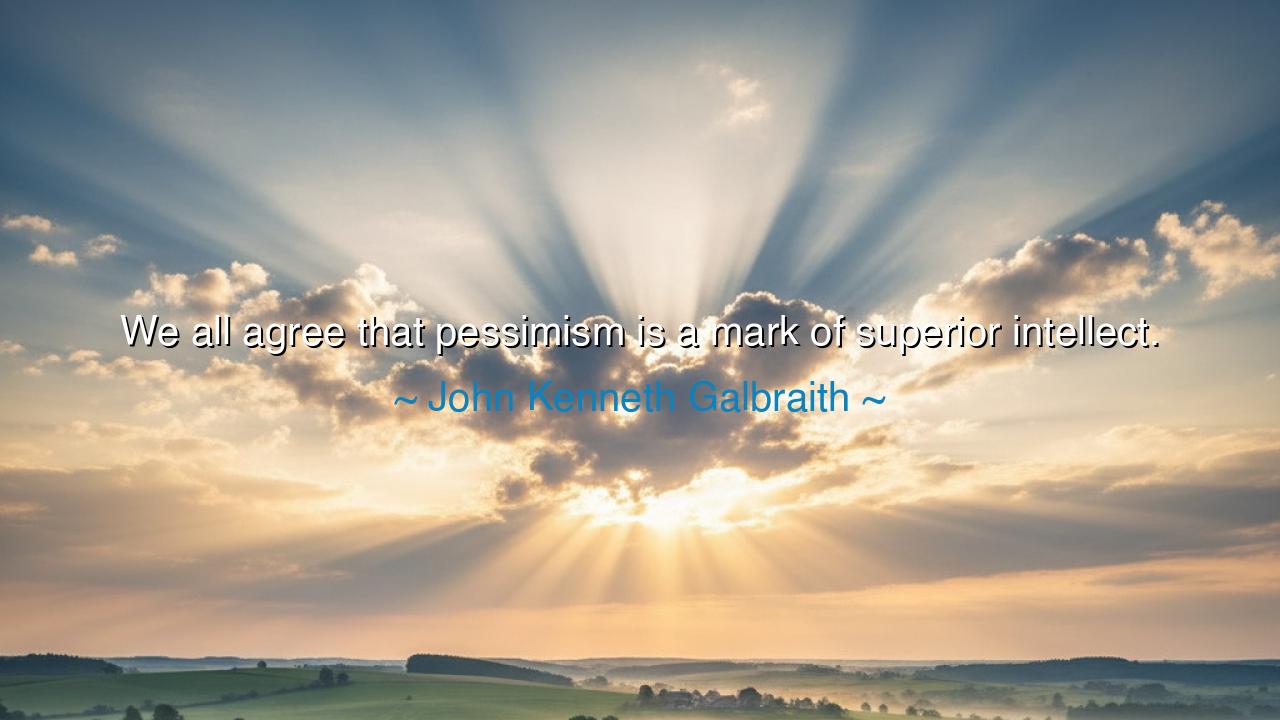
We all agree that pessimism is a mark of superior intellect.






“We all agree that pessimism is a mark of superior intellect.” — Thus spoke John Kenneth Galbraith, the keen economist and philosopher of society, whose mind gazed deeply into the machinery of human progress and folly alike. In this sharp and paradoxical saying, Galbraith unveils a truth both humorous and profound: that men often mistake pessimism for wisdom, and see doubt as the badge of intelligence. For in a world filled with deception, false hope, and the vanity of ambition, the man who doubts, who questions, who foresees danger, appears to the crowd as one endowed with greater clarity of mind. And yet, beneath his irony, Galbraith asks us to ponder whether such superior intellect is indeed superior — or whether it blinds itself to the light of possibility.
In the ancient days, those who prophesied doom were often revered as wise. The pessimist is ever cautious, ever aware of how fragile human success can be. He sees the cracks before the wall crumbles, and so others call him farsighted. In times of war, he predicts defeat; in times of peace, he warns of unrest; in times of prosperity, he speaks of collapse. And often he is right, for history itself is a cycle of triumph and ruin. Thus the pessimist, standing apart from the naïve multitude, seems to possess a vision closer to truth — and in this sense, as Galbraith suggests, pessimism bears the aura of intellect.
But Galbraith, the man of irony and insight, was no worshiper of gloom. His words carry the subtle laughter of the wise — a recognition that intelligence is not truly proven by cynicism, but that in society, pessimism often masquerades as depth. For it is easy to appear clever by doubting everything. To hope requires courage; to despair requires only observation. Many speak as pessimists not because they see more, but because they fear more. The true sage knows that seeing the flaws of the world is not the same as understanding its potential.
Consider the story of Winston Churchill in the dark years of 1940. Surrounded by defeat, his nation wounded and alone, he saw clearly the peril that loomed — yet he did not surrender to pessimism. His intellect was not dulled by despair, but sharpened by hope. “We shall never surrender,” he said, and in those words, intelligence became courage. He was not blind to darkness; he simply refused to live as its servant. Thus, while the pessimist might have seemed wiser in foresight, it was the man of balance — who saw both danger and possibility — who changed history.
Galbraith’s own age was one of contradictions — great prosperity and great fear, scientific progress and social unrest. He saw how, in such times, the pessimists gained followers. They seemed superior to the optimists, for their gloom sounded like realism, while hope sounded like folly. Yet Galbraith knew that civilization survives not through despair, but through the stubborn belief that improvement is possible. The intellect, if truly superior, must not only diagnose sickness but seek the cure. To know the flaws of mankind is easy; to labor still for its betterment is divine.
The lesson, then, is not to despise the pessimists, but to understand their power — and their limitation. Their caution protects us from folly, but their doubt can imprison us if left unchecked. To be wise is to see clearly both the shadows and the light, to accept the world’s imperfection yet strive for its renewal. Let pessimism sharpen your reason, but let hope guide your heart. For intellect without faith becomes cold and barren, and faith without intellect becomes blind.
So remember the wisdom hidden in Galbraith’s jest: pessimism may sound intelligent, but it is hope that builds civilizations. Be not content to seem wise by despair, but prove your wisdom by perseverance. Doubt what must be doubted — but never doubt the power of action, of progress, of light. The truly superior mind is not the one that sees the end of all things, but the one that, seeing it, dares still to begin again.






AAdministratorAdministrator
Welcome, honored guests. Please leave a comment, we will respond soon